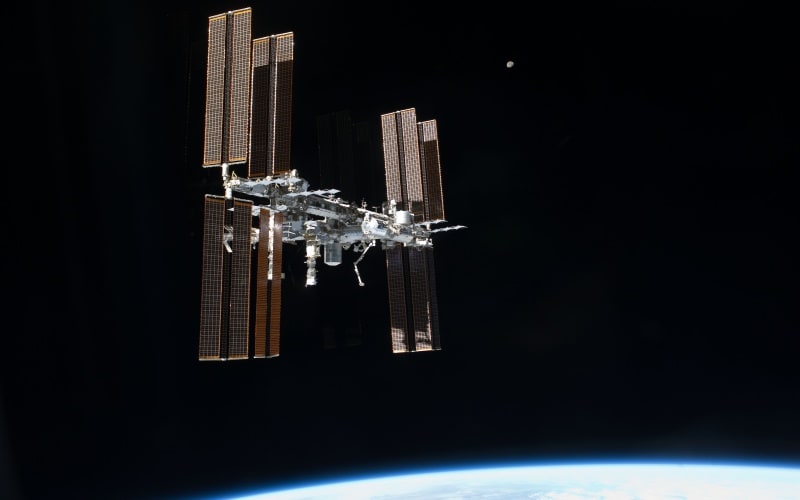- Home
- Science
- Science News
- NASA Says It Keeps a Close Watch for Bad Bags on the ISS
NASA Says It Keeps a Close Watch for Bad Bags on the ISS

Photo Credit: NASA
Scientists at NASA organise regular checks to ensure that the International Space Station (ISS) has one of the cleanest living environments and is free from bacteria and other micro-organisms, the space agency said.
"Once every three months, we sample from two locations in each module of the US segment of the station," Mark Ott, a microbiologist at NASA's Johnson Space Center, said in a statement.
Samples collected from surfaces and from the air are cultured on plates containing a growth medium, one specific for bacteria and the other for fungi. Those plates return to the ground and scientists identify each organism that grows on them.
The study, published in the journal of Microbiome, identified 11 strains of bacterium belonging to what microbiologists call the Bacillus anthracis, cereus, thuringiensis group, or Bacillus cereus group.
While this large family of microbes includes some bad bugs, Bacillus is extremely common on the Earth and around humans, so finding this type of bacteria on the space station is not unusual, the scientists said.
Using DNA hybridisation, researchers identified individual species in the samples and, while some were a close match to Bacillus anthracis type strains, they did not have the physical characteristics or the toxin-producing plasmids required to consider them a potential risk.
Further, drinking water on the ISS is treated similarly to the water we drink on earth to kill and keep micro-organisms from growing with regular monitoring on the station's drinking water systems.
"The astronauts' drinking water is, microbiologically speaking, cleaner than just about anything they drink on earth," Ott said.
In addition, the medical staff keeps a particularly sharp eye out for micro-organisms that pose a risk to the health of astronauts and when any turn up, the space station gets a more-thorough-than-usual cleaning.
"We should be investigating new and different ways of monitoring spacecraft for micro-organisms but we must be careful when we interpret the results," Ott added.
Continued research is being done to understand what organisms grow on the space station and how they affect an astronaut's health, the scientists said.
For the latest tech news and reviews, follow Gadgets 360 on X, Facebook, WhatsApp, Threads and Google News. For the latest videos on gadgets and tech, subscribe to our YouTube channel. If you want to know everything about top influencers, follow our in-house Who'sThat360 on Instagram and YouTube.
Related Stories
- Samsung Galaxy Unpacked 2025
- ChatGPT
- Redmi Note 14 Pro+
- iPhone 16
- Apple Vision Pro
- Oneplus 12
- OnePlus Nord CE 3 Lite 5G
- iPhone 13
- Xiaomi 14 Pro
- Oppo Find N3
- Tecno Spark Go (2023)
- Realme V30
- Best Phones Under 25000
- Samsung Galaxy S24 Series
- Cryptocurrency
- iQoo 12
- Samsung Galaxy S24 Ultra
- Giottus
- Samsung Galaxy Z Flip 5
- Apple 'Scary Fast'
- Housefull 5
- GoPro Hero 12 Black Review
- Invincible Season 2
- JioGlass
- HD Ready TV
- Laptop Under 50000
- Smartwatch Under 10000
- Latest Mobile Phones
- Compare Phones
- Redmi Turbo 4
- Vivo Y200+
- Lava Yuva 2 5G
- OnePlus Ace 5
- OnePlus Ace 5 Pro
- Oppo A5 Pro 5G
- Vivo Y29 5G
- Honor Magic 7 RSR Porsche Design
- Asus Zenbook S 14
- MacBook Pro 16-inch (M4 Max, 2024)
- Honor Pad X9 Pro
- Honor Pad V9
- boAt Enigma Gem
- boAt Enigma Daze
- Sony 65 Inches Ultra HD (4K) LED Smart TV (KD-65X74L)
- TCL 55 Inches Ultra HD (4K) LED Smart TV (55C61B)
- Sony PlayStation 5 Pro
- Sony PlayStation 5 Slim Digital Edition
- Blue Star 1.5 Ton 3 Star Inverter Split AC (IC318DNUHC)
- Blue Star 1.5 Ton 3 Star Inverter Split AC (IA318VKU)

















